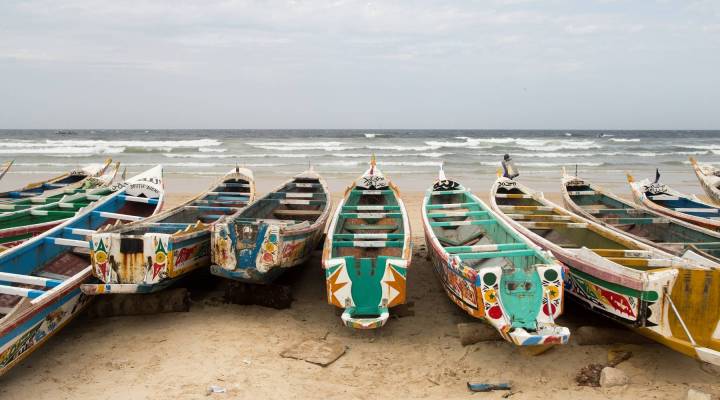
A rise in foreign industrial trawlers off the coast of Senegal is causing local fishermen to lose their livelihoods
A rise in foreign industrial trawlers off the coast of Senegal is causing local fishermen to lose their livelihoods

The beach in Dakar, Senegal is empty except for a group of singing fishermen, pushing their colorful wooden boat back to shore. The windy weather has kept many on land today – including Mamadou Mbaye, head of Senegal’s fishermen union. He says the sea is depleted of fish because of foreign trawlers, and fishermen often work three straight months in order to make just under $20 a day – half of which goes to expenses like gasoline. And here’s no guarantee they’ll catch something. The fish, he adds, started to go away about ten years ago.
While climate change is one issue leading to a depletion of fish stocks in West Africa, foreign industrial fleets – sometimes fishing illegally – come with their trawlers and capture large quantities of fish, leaving fewer fish for local fishermen to catch. One mega-trawler can capture up to 20,000 tons of fish a year, the annual capacity of about 1,700 of the large wooden canoes local West African fishermen use. As a result, West Africa is losing $1.3 billion a year. Senegal, one of the countries hardest hit, is losing $300 million a year, or 2 percent of its GDP.
The Senegalese economy depends on the fishing industry in order to thrive: about one-quarter of the country’s jobs are in small-scale fisheries. Yet with fewer fish, some of those jobs are going away. It’s one of the reasons many young men are migrating to Europe.
“The ultimate goal is food security,” said Khady Sané Diouf, director of COMFISH, a project funded by USAID that provides workshops and support for Senegal’s fisheries. “Now, we don’t have fresh fish. So that’s the first goal, to allow the Senegalese to meet their fish needs.”
Diouf says Senegalese people have fewer fish to eat, and the fish that’s available is getting more expensive. Yet it’s not only coastal communities that are hurt. Mamadou Diallo, also with COMFISH, says inland communities – even outside Senegal – depend on fish as their primary source of animal protein.
“People inland generally get processed fish because there’s no way to keep the fish refrigerated through the route,” Diallo said.
There’s an entire economic chain affected by decreased fish stocks: from the fishermen, to the women selling fish at the markets, to the trucks transporting fish inland. For now, the organization’s goal is to improve the quality of fish they do have available.
To help do that, COMFISH is working directly with the fishermen to engage them in fisheries management and planning, Diouf said. The group is trying to change fishing behaviors, by discouraging fishermen from using nylon nets, which are harmful to the environment, and from catching fish that have not yet matured. Their slogan is “Fish less, sell more.”
This story has been co-funded by the European Journalism Centre via its Innovation in Development Reporting Grant Program.
| Is a career in fishing still sustainable? |
| A rural Alaskan village established a reindeer herd to improve diet and boost economy |
| Do farmed Atlantic salmon have a future on the West Coast? |
There’s a lot happening in the world. Through it all, Marketplace is here for you.
You rely on Marketplace to break down the world’s events and tell you how it affects you in a fact-based, approachable way. We rely on your financial support to keep making that possible.
Your donation today powers the independent journalism that you rely on. For just $5/month, you can help sustain Marketplace so we can keep reporting on the things that matter to you.












